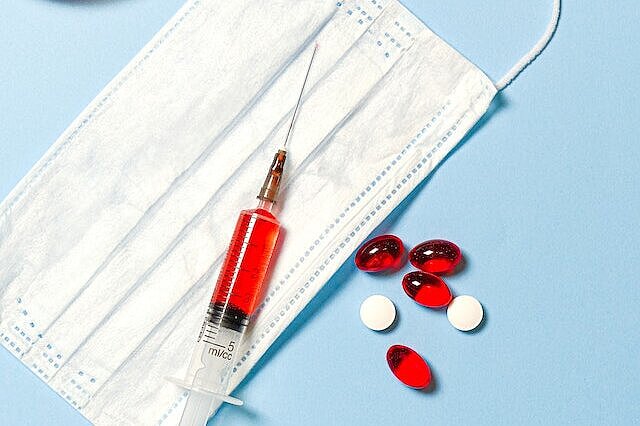Fibrinogen

What is fibrinogen?
Fibrinogen is a soluble protein that is produced in the liver and circulates in the plasma of all mammals, including dogs. It plays a central role in the blood clotting process: when injured, fibrinogen is converted into insoluble fibrin by the action of the enzyme thrombin, which in turn forms a network that serves as the basis for a blood clot. This clot helps to stop the bleeding and serves as the first phase of wound healing.
Advantages of fibrinogen
- Important factor in wound healing: The main function of fibrinogen - to assist in the formation of blood clots - is crucial in stopping bleeding and initiating the healing process in injuries.
- Marker for inflammation: High fibrinogen levels can indicate the presence of inflammation in the body. In this capacity, fibrinogen serves as a useful biomarker for the diagnosis and monitoring of inflammatory conditions.
- Helps in the diagnosis of disease: Abnormal fibrinogen levels can indicate a number of conditions, including liver disease, which affects the ability to produce clotting factors, or genetic disorders that affect blood clotting.
Disadvantages and risks
- Risk of thrombosis: While efficient blood clotting is vital, excess fibrinogen can increase the risk of thrombosis. Blood clots can cause life-threatening conditions such as heart attacks or strokes if they occur in critical areas of the circulatory system.
- Difficult balance: Maintaining the right level of fibrinogen is crucial. Both too high and too low levels can cause health problems, making monitoring a constant necessity.
- Diagnostic challenges: Abnormal fibrinogen levels can indicate a variety of conditions, making diagnosis difficult without additional testing.
Fibrinogen is a crucial protein that plays a central role in the blood clotting process in our dogs. It not only effectively supports wound healing, but also serves as an important marker for inflammation and other diseases. Monitoring fibrinogen levels can therefore provide important insights into a dog's health and contribute to the early detection of disease. Nevertheless, managing fibrinogen levels requires attention and expertise to maintain balance and minimize the risk of complications.
If you notice any signs of hypersensitivity or poisoning in your dog, you should see your vet immediately. We are not a substitute for a vet, but we try to be as accurate as possible. Every dog reacts differently and we recommend you get a second opinion or consult your vet if in doubt.
Stay healthy and take good care of your four-legged friend!😊
Similar to Fibrinogen
A low albumin level in the blood of dogs, also known as hypoalbuminemia, can indicate various health problems affecting the liver, kidneys or intestines. Some possible causes of hypoalbuminemia...
Globulins are a diverse group of proteins found in blood plasma, body fluids and in many animal and plant cells. They differ in their function, structure and solubility from other protein types such...
Myoglobin is a protein found in the muscle cells of almost all vertebrates, including dogs. It has the important task of storing oxygen and delivering it to the muscle cells, especially during...
Hemoglobin is a protein found in red blood cells. It consists of four subunits, each of which contains an iron atom. This iron atom can bind oxygen and release it again. This enables haemoglobin to...



